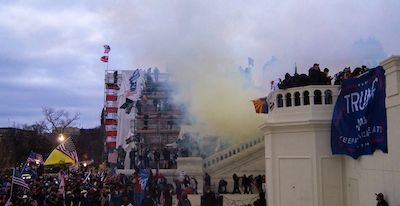The Threat to the United States
Robert Slayton looks to the past to find ominous tidings.
By Robert SlaytonJuly 8, 2022

HERE IT WAS, the pronouncement of a Florida politician — or was it a Texan: “The sacredness of our Sabbath, of our homes […] and finally even of our right to teach our own children in our own schools fundamental facts and truths [has been] torn away from us.”
Then a bold manifesto, echoing a familiar campaign slogan: “We believe […] that we have the right to make America American and for Americans” in a nation “disorganized and helpless before the invasion of aliens and alien ideas.”
He went on: liberals have become “wholly academic, lost all touch with the plain people, disowned its instincts and common sense” because they believe “those who can produce should carry the unfit.” Worst of all, this has risen to a terrible momentum, attacking our heritage as bigoted instead of noble, racist instead of honored. “This became a world without moral standards.”
Each of these quotes is from Hiram Wesley Evans’s 1926 article in North American Review, “The Klan’s Fight for Americanism.” Evans was the imperial wizard of the Ku Klux Klan in that decade and its great proselytizer, the Fox News commentator of his day.
Yet the words sound recent. A 2022 poll from the University of Massachusetts Amherst found 66 percent of Republicans accept “white replacement theory,” agreeing wholly or partly with the claim that “the Democratic Party is trying to replace the current electorate with voters from poorer countries around the world.” Florida’s lieutenant governor has openly accused Disney of “indoctrinating” and “sexualizing children” with its “not secret agenda.”
Ideas carry enormous weight — and often violence. Hitler believed the United States was “a decayed country […] Everything about the behavior of American society reveals that it’s half Judaised, and the other half negrified.” On December 12, 1941, the day after he declared war on the United States, Hitler predicted that all Jews worldwide “would experience their annihilation.” With the world war finally underway, “the annihilation must be the necessary consequence.”
Like a gardener on the lookout for weeds, Americans — those who truly seek to uphold democracy — must recognize danger on our shores and deal with it, perennially.
¤
¤
Featured image: "Tear Gas outside United States Capitol 20210106" by Tyler Merbler is licensed under CC BY 2.0.
LARB Contributor
Robert Slayton is professor emeritus in history at Chapman University. Slayton is the author of eight books. His book Beauty in the City: The Ashcan School (SUNY Press, 2017) won the Gold Medal for US Northeast–Best Regional Non-Fiction in the 2018 Independent Publisher Book Awards (IPPY) and Silver for Nonfiction History in the 2017 Foreword INDIES Book of the Year Awards. Empire Statesman (2001), his biography of Alfred E. Smith, 1928 presidential candidate and the first Roman Catholic to run for the nation’s highest office, was endorsed by Pulitzer Prize winner Robert Caro, who called it “vivid and insightful,” while Hasia Diner, holder of the Steinberg Chair at New York University, referred to it as an “exemplary biographical narrative.” It has been reviewed in The New York Times, The Wall Street Journal, and The New Yorker; Wikipedia cites Empire Statesman as the standard biographical work on Smith. His book Back of the Yards: The Making of a Local Democracy (University of Chicago Press, 1986) was chosen by Choice, the library journal, as one of its “Outstanding Books,” while New Homeless and Old: Community and the Skid Row Hotel (Temple University Press, 1990) was awarded Honorable Mention for the Paul Davidoff Award by the Association of Collegiate Schools of Planning. His articles have appeared in Commentary, New Mobility, and Salon, and in newspapers including The New York Times, The Washington Post, Chicago Tribune, Chicago Sun-Times, Los Angeles Times, and The Orange County Register.
LARB Staff Recommendations
Sinclair Lewis’s Nightmare: On “This Happened Here” and “Rising Fascism in America”
Two books take Trump’s authoritarian impulses with a sense of alarm.
Race, Labor, and Statues
What is “the process” for taking down Confederate statues? There isn’t one.
Did you know LARB is a reader-supported nonprofit?
LARB publishes daily without a paywall as part of our mission to make rigorous, incisive, and engaging writing on every aspect of literature, culture, and the arts freely accessible to the public. Help us continue this work with your tax-deductible donation today!